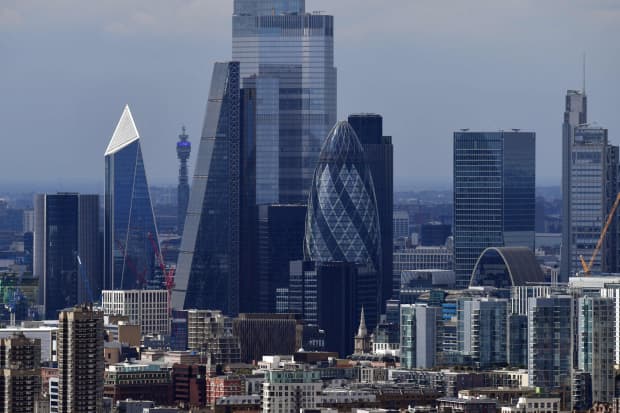This post was originally published on this site

Businesses have scaled back expectations and are focused on strengthening their balance sheets.
daniel leal-olivas/Agence France-Presse/Getty Images
The outlook for Britain’s biggest companies is worsening and won’t recover to pre-pandemic levels until at least the second half of next year, as the country falls deeper into recession.
That is the conclusion of Deloitte’s latest chief financial officer survey, which gauged the sentiment among the U.K.’s top finance directors, between Sept. 22 and Oct. 6, to learn their views on the major risks facing their business.
“British businesses are gearing up for a long winter with COVID-19, with a full recovery on the horizon only after next summer,” said Ian Stewart, chief economist at Deloitte.
“With further restrictions coming into effect, businesses have scaled back expectations and are focused on strengthening their businesses and their balance sheets,” he added.
Read: U.K. economy is set for a ‘dramatic slowdown,’ Deutsche Bank warns after jobless numbers rise
The U.K. economy grew less than expected in August, heaping more pressure on policy makers to support the economy, according to data published by the Office for National Statistics on Oct. 9. Gross domestic product rose by 2.1% in August, compared with growth of 6.4% in July. Most of the growth in August was down to Chancellor Rishi Sunak’s dine-out incentive.
Despite the uncertainty, the majority of CFOs surveyed expect to take back furloughed staff, with an average of 82% of employees expected to remain on payrolls.
Read: How the Great British pub is reeling under new COVID-19 rules
The negative effects of COVID-19 overshadowed Brexit concerns, with 75% predicting that the pandemic will have ‘significant’ or ‘severe’ negative effects on their businesses over the next 12 months. By contrast, 23% expect similar negative effects due to Brexit.
Deloitte’s survey was carried out before Prime Minister Boris Johnson said on Oct. 16 that that the trade talks are “over” unless there is a “fundamental” change of position from the European Union.
Responding to Johnson, the Confederation of British Industry said in a statement that a deal “is the only outcome that protects COVID-hit livelihoods at a time when every job in every country counts.”
Read: U.K. says door ‘still ajar’ for post-Brexit talks with EU
Around a third (30%) of CFOs said they would reduce hiring in the event of a ‘no-deal’ scenario, compared with 15% in a thin-deal one, which would ensure tariff-free goods-trade only. Twenty-six percent of CFOs said they would decrease capital expenditure in a ‘no-deal’ scenario, compared with 11% in the event of a thin deal.
“With less than 75 days to the end of the transition period, we expect businesses to accelerate the implementation of their Brexit plans in the next few weeks, with a particular focus on the interplay between Brexit and COVID-19,” said Amanda Tickel, Brexit lead at Deloitte.
More than three-quarters of finance leaders (78%) expect U.K. corporates to reduce capital expenditure in the next 12 months, maintaining the sentiment seen in Quarter 2, where the majority (86%) anticipated a decrease, Deloitte said.
It added that the pandemic has meant businesses have made greater investment in some areas, like technology, while reducing it in others.
A total of 102 CFOs participated in the latest survey, including CFOs of 21 FTSE 100 and 37 FTSE 250 companies. The combined market value of the U.K.-listed companies that participated is £417 billion, approximately 20% of the U.K. quoted equity market.

